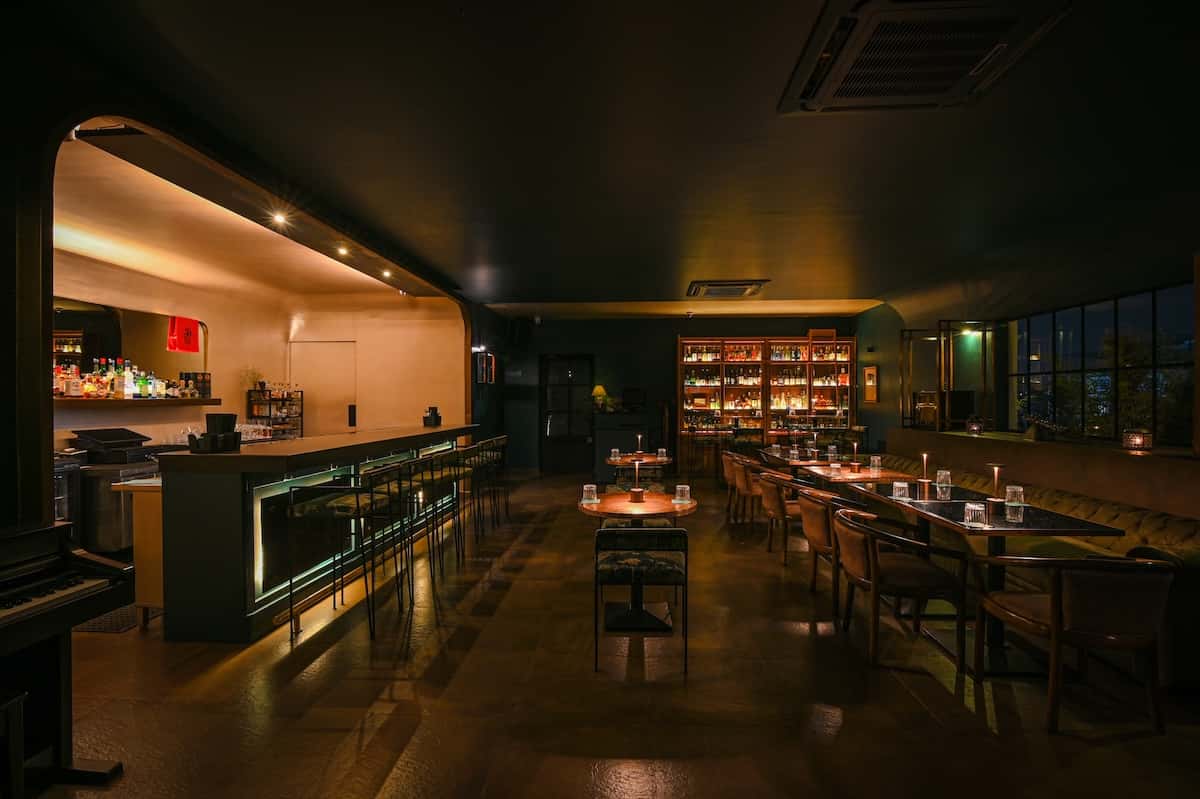Abhishek Tuladhar never imagined that leaving his finance job in Singapore would lead to international recognition. But his Kathmandu speakeasy, Barc, has just claimed the prestigious Asia’s 50 Best Bars 2025 Michter’s Art Of Hospitality Award – making it the first Nepalese bar to receive the honor.
It’s a heady ascent for the Kathmandu cocktail bar that opened in 2021, as Barc crept into Asia’s 50 Best Bars extended 51-100 list in 2023, debuting at number 100, before climbing to number 39 last year. Now, ahead of the announcement of Asia’s 50 Best Bars 2025 in Macau on 15th July, Abhishek Tuladhar and the team at Barc have been commended for their impeccable hospitality.

Abhishek Tuladhar The Accidental Bartender
But for Abhishek Tuladhar – a man who has the measured, scholarly air of someone who’s been contemplating cocktails for a long time and the cherubic fresh face of someone who hasn’t – the story begins long before all this, with expensive cocktails and an empty wallet. “In Singapore, $25 to $30 for a cocktail was hitting my finances hard,” Abhishek recalls with a laugh. “A friend taught me to make cocktails at home, and that’s when I fell in love with the craft.”
What started as a money-saving measure evolved into something much deeper when he returned to Nepal in 2016.
The cocktail scene in Kathmandu was virtually non-existent. “Cocktails had a bad reputation – they were either unbalanced or people just weren’t drinking them. Everyone was ordering neat whiskeys or vodka sodas,” he remembers.
And so, rather than diving headfirst into opening a bar, Abhishek spent three years doing the hard yards – hosting pop-ups in restaurants and catering for weddings of 500 people – slowly building a reputation for good drinks.

Mining Nepal’s Flavors At Barc Kathmandu
What sets Barc apart isn’t just the hospitality – it’s the radical reimagining of Nepal’s culinary heritage through cocktails. Take their Orange Sadeko, Abhishek’s current favorite cocktail that’s not even on the Barc menu yet. It’s inspired by a winter comfort food: after heavy meals, Nepalese families eat curd tempered with spices and sesame, mixed with pomelo from backyard trees. Abhishek transforms this into a vodka-washed cocktail with creamy sesame and citrus notes.
Then there’s the Bloody Nepali, made with hog plum (known locally as lapsi). “It’s like the Indian aamras (a Gujarati dish made of sugared mango pulp) — spicy, tangy, sweet, sour, everything in one. An explosion in your mouth,” as he describes it. The cocktail captures the complexity of this beloved street snack, transforming childhood memories into liquid form.
Perhaps most ambitious is Barc’s championing of aila, a Nepalese single-distilled rice spirit similar to Chinese baiju. “It has a very earthy flavor,” Abhishek elaborates. “We infuse it with local spices and make it into sours and punches.” It’s akin to cocktail archaeology – unearthing forgotten spirits and giving them contemporary expression.

The Self-Preservation Society
Behind these innovative drinks lies a practical philosophy shaped by economic realities. With cocktails priced from $7-12 using local spirits (jumping to $15-18 with imported brands), Abhishek had to get creative with costs while maintaining quality. His solution has been to deploy preservation techniques that Nepal has perfected over centuries.
“We use a lot of preserved ingredients – those dried hog plums, freeze-dried fruits, fermented vegetables. Nepal is really good at preserving,” he notes. This approach serves multiple purposes: keeping costs down, ensuring year-round availability, and embracing sustainability. “If we used too many fresh products, we’d have wastage, and margins are already thin.”
Genuine Hospitality in a Digital World
What earned Barc the hospitality award isn’t just the drinks – it’s the distinctly Nepalese approach to service. “Our interactions are very genuine, and that’s not just the bar, it’s Nepal itself,” Abhishek nods proudly. “If you’ve ever visited Nepal, you’ll see it’s the people. The interactions are always very genuine.”
This authenticity resonates in an era where bars worldwide are becoming increasingly theatrical. “People are leaning away from digital interactions during hospitality experiences. They’re seeking genuine interactions, authentic memories,” Abhishek agrees.
At Barc, this translates to bartenders coming out from behind the bar to chat with guests, customers crowding around to watch drinks being made, and a general sense of warmth that’s become the bar’s signature. “People are now hovering around the bar talking to the bartender while they’re making drinks,” Abhishek observes. “That evolution has been really good.”

Building The Kathmandu Cocktail Scene From Scratch
When Barc opened in 2021, it was one of three cocktail bars that launched within months of each other – the pioneers of Kathmandu’s cocktail renaissance.
Now, the transformation is evident. “People are starting to understand flavors,” he says. “When they come in, they’re looking for new cocktail experiences, new hospitality, new conversations.” The city that once knew only dive bars and beer halls now has guests asking detailed questions about techniques and ingredients.
The Asia’s 50 Best Bars award represents more than recognition for a single establishment – it’s validation for an entire country’s hospitality potential. “This is a big win for Nepal,” Abhishek emphasizes. “We’ve had such good global ambassadors – Nepalese bartenders across the world putting our name out there. Now it’s time to bring the outside in.”
The team at Barc, including bar manager Sagar and bartender Rajni, are doing just that while traveling internationally for guest shifts, representing Nepal in mature cocktail markets across Asia. “They hadn’t traveled outside Nepal before, and now they’re going to Japan, Manila, Singapore, telling their stories with confidence.”
The Future of Himalayan Hospitality
Looking ahead, Abhishek envisions Barc as becoming an educational hub for Nepal’s developing cocktail scene. Plans include industry-only events, brand education programs, and bringing international talent to Kathmandu. “We have events dedicated only to bartenders where we close the doors and do industry-only sessions to help give bartenders exposure.”
A second location is in the works too – an eight-seater bar in one of Kathmandu’s historic buildings, designed to bring Barc’s philosophy to tourist areas. But the real goal is broader: demonstrating that Nepal’s young bartenders don’t need to leave the country to find opportunities.

A Toast to Authenticity
For first-time visitors to Barc, Abhishek recommends their Juju Basil – made with Nepal’s high-fat curd that’s aged in clay pots until thick and naturally sweet, combined with fresh basil. “It’s been very universal – everyone across wherever we’ve taken it has enjoyed that cocktail.”
In an industry often criticized for style over substance, Barc’s success story offers a different path forward. By mining local traditions, training hometown talent, and maintaining genuine hospitality, this Himalayan speakeasy has proven that authenticity isn’t just good karma – it’s good business.
As Abhishek prepares for more of his own guest shifts across Asia, carrying Nepal’s flavors to international audiences, he’s not just making cocktails. He’s crafting cultural ambassadors, one perfectly balanced drink at a time.
In a world of increasingly homogenized bar experiences, Barc’s triumph suggests that the most powerful ingredient might just be staying true to where you come from.










 Wink Hotels' is a new kind of Vietnamese hotel made for the modern traveler and ready to take on the world.
Wink Hotels' is a new kind of Vietnamese hotel made for the modern traveler and ready to take on the world.